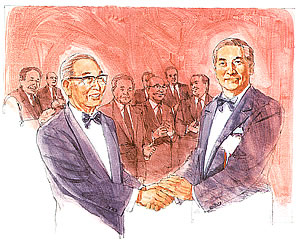Part 6: Big Business Syndrome and Mr. Tateisi's Legacy
Fighting "big business syndrome" as Chairman

Through an unceasing commitment to R&D, OMRON went from being a small factory to an industry leader with diversified information systems and products. In 1979, the company's yearly sales amounted to 100 billion yen. Having spent 46 years as president, Kazuma Tateisi handed the reigns over to his first son, Takao, and took on the position of chairman.
As chairman, Mr. Tateisi's role was to determine the direction the company should be heading. In his New Year's message to OMRON employees in 1983 (OMRON's 50th anniversary), Chairman Tateisi pointed out that OMRON was suffering from "big business syndrome." He said, "To effectively take care of this problem before it can cause further damage, we must all adopt a 'do-or-die' approach. It is essential that we transform OMRON into a company dominated by social awareness and a venture spirit, two qualities that drove our growth in the early days." Following his speech, employees threw themselves behind the effort to take OMRON from a company in the throws of big business syndrome to one with a forward-looking approach.
Introducing OMRON Corporation

In 1987, Chairman Tateisi became the company's executive advisor. His first son, Takao, was appointed chairman; his second son, Nobuo, vice chairman; and his third son, Yoshio, president. (Yoshio Tateisi is currently Chairman).
When considering the company's future, Executive Advisor Tateisi realized that the company's name would have to be changed; accordingly, it was renamed "OMRON Corporation" in January 1990. Mr. Tateisi gave his reasons for the name change as follows:
"Our company has now enjoyed three inaugurations, from its establishment in 1933 as Tateisi Electric Manufacturing, to OMRON Tateisi Electronics Co. in 1948, and now to OMRON Corporation.
Initially, the domestic media did not now how to respond to the change. That's because it's unusual for companies to change their names while the founder is alive, and what's more, 'Tateisi' is no longer included.
The reason for the change is simple: 'Tateisi' is difficult for non-Japanese to pronounce. Actually, I knew we would have to change our name as far back as 1970, when OMRON first issued convertible bonds in Europe. During my visit there, I realized that we would someday be listed on foreign stock exchanges and widely publicized around the world. Common sense told me that 'Tateisi' would have to be removed from the company name for ease of use internationally."
Establishment of the Tateisi Science and Technology Foundation

In 1990, in commemoration of the company's new start, Mr. Tateisi put some of his shares toward the establishment of the Tateisi Science and Technology Foundation. Marking the culmination of Mr. Tateisi's lifelong dream of creating a facility to support science and technology research, the Foundation provides grants to researchers both in and outside Japan. By helping advance the work of a new generation of researchers, Mr. Tateisi's management philosophy ("To the machine, the work of the machine, to man the thrill of further creation") continues to live on today.
HIGHLIGHT
Quotes from Kazuma 6: Big business syndrome
"Big business syndrome" was Mr. Tateisi's way of referring to a problem that plagued many companies at the time. The expression became an industry catchphrase after it was featured in various newspapers and magazines. Mr. Tateisi was taken aback by its popularity. He said, "By the fall of that year everyone was talking about big business syndrome. I really didn't think I had come up with anything new; I was simply describing the situation I saw happening at that time. What I realized was that no one, including myself, really wanted to be the first to come out publicly and admit that it was a problem. The only reason I eventually did is that I had some ideas about what we could do to improve the situation."
Mr. Tateisi laid out his management philosophy in a book entitled The Eternal Venture Spirit. Focusing on an entrepreneurial spirit and the processes needed to put it into practice, the book, which has been translated into English, Chinese and Russian, proved to be a useful guide for business executives throughout the world.
